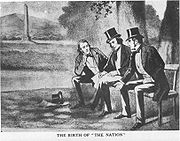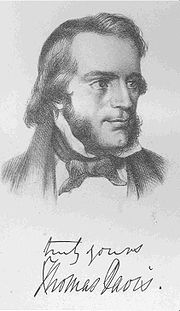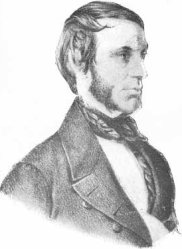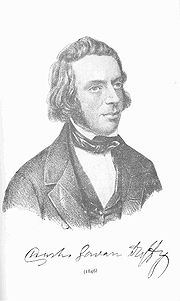
The Nation (Irish newspaper)
Encyclopedia

Newspaper
A newspaper is a scheduled publication containing news of current events, informative articles, diverse features and advertising. It usually is printed on relatively inexpensive, low-grade paper such as newsprint. By 2007, there were 6580 daily newspapers in the world selling 395 million copies a...
, published in the 19th century. The Nation was printed first at 12 Trinity Street, Dublin, on 15 October 1842, until 6 January 1844. The paper was afterwards published at 4 D'Olier Street from 13 July 1844, to 28 July 1848, when the issue for the following day was seized and the paper suppressed, and at a Lower Abbey Street on its revival in September, 1849.
Background

Charles Gavan Duffy
Additional Reading*, Allen & Unwin, 1973.*John Mitchel, A Cause Too Many, Aidan Hegarty, Camlane Press.*Thomas Davis, The Thinker and Teacher, Arthur Griffith, M.H. Gill & Son 1922....
, who became editor; Thomas Osborne Davis
Thomas Osborne Davis (Irish politician)
Thomas Osborne Davis was a revolutionary Irish writer who was the chief organizer and poet of the Young Ireland movement.-Early life:...
, and John Blake Dillon
John Blake Dillon
John Blake Dillon was an Irish writer and Politician who was one of the founding members of the Young Ireland movement....
. All three were members of Daniel O'Connell
Daniel O'Connell
Daniel O'Connell Daniel O'Connell Daniel O'Connell (6 August 1775 – 15 May 1847; often referred to as The Liberator, or The Emancipator, was an Irish political leader in the first half of the 19th century...
's Repeal Association
Repeal Association
The Repeal Association was an Irish mass membership political movement set up by Daniel O'Connell to campaign for a repeal of the Act of Union of 1800 between Great Britain and Ireland....
, and would later become to be known as Young Ireland
Young Ireland
Young Ireland was a political, cultural and social movement of the mid-19th century. It led changes in Irish nationalism, including an abortive rebellion known as the Young Irelander Rebellion of 1848. Many of the latter's leaders were tried for sedition and sentenced to penal transportation to...
.The name suggested by Duffy for the paper was "The National" but Davis disagreed, suggesting "that the use of an adjective for such a purpose was contrary to the analogies of the English language," and suggested "The Nation." This they all agreed to. "We desired to make Ireland a nation," Duffy wrote, "and the name would be a fitting prelude to the attempt.". In due course and after many other consultations between the founders, the following announcement was made as to the date of publication, the name of the journal, and the contributors:.
On the first Saturday in October will be published the first number of a;
DUBLIN WEEKLY JOURNAL
TO BE CALLED
"THE NATION,"
for which the services of the most eminent political writers in the country have been secured.
It will he edited by
Charles Gavan DuffyCharles Gavan DuffyAdditional Reading*, Allen & Unwin, 1973.*John Mitchel, A Cause Too Many, Aidan Hegarty, Camlane Press.*Thomas Davis, The Thinker and Teacher, Arthur Griffith, M.H. Gill & Son 1922....
, Editor of The VindicatorThe VindicatorThe Vindicator, also known at times as The Youngstown Vindicator, is a daily newspaper serving Youngstown, Ohio and the Mahoning County Region as well as southern Trumbull County and northern Columbiana County. Founded in 1869, the newspaper currently has a circulation of 62,100 daily and 87,000...
, aided by the, following distinguished contributors:—
JOHN O'CONNELL, ESQ., M.P.;
Thomas Osborne DavisThomas Osborne DavisThomas Osborne Davis may refer to:*Thomas Osborne Davis , Saskatchewan parliamentarian*Thomas Davis , Young Ireland writer and politician...
, Esq., Barrister-at-Law;
W. J. O'Neill Daunt, Esq., Author of The Green Book.,
John B. DillonJohn Blake DillonJohn Blake Dillon was an Irish writer and Politician who was one of the founding members of the Young Ireland movement....
, Esq., Barrister-at-Law
Clarence ManganJames Clarence ManganJames Clarence Mangan, born James Mangan was an Irish poet.-Early life:Mangan was the son of a former hedge school teacher who took over a grocery business and eventually became bankrupt....
, Esq., Author of Anthologia Germanica and Litterae Orientales;
The Late Editor of the London MagazineLondon MagazineThe London Magazine is a historied publication of arts, literature and miscellaneous interests. Its history ranges nearly three centuries and several reincarnations, publishing the likes of William Wordsworth, William S...
and CharivariCharivariCharivari is the term for a French folk custom in which the community gave a noisy, discordant mock serenade, also pounding on pots and pans, at the home of newlyweds. The loud, public ritual evolved to a form of social coercion, for instance, to force an as-yet-unmarried couple to wed...
,
J. C. Fitzgerald, Editor of The True Sun,
And others whose 'names we are not at liberty
to publish.".
(For some reason, the paper did not appear until the second Saturday (15th) of October, 1842.)
The Prospectus of The Nation

"The projectors of the NATION have been told that there is no room in Ireland for another Liberal Journal; but they think differently. They believe that since the success of the long and gallant struggle which our fathers maintained against sectarian ascendancy, a NEW MIND has grown up amongst us, which longs to redress other wrongs and achieve other victories; and that this mind has found no adequate expression in the press.
"The Liberal Journals of Ireland were perhaps never more ably conducted than at this moment; but their tone and spirit are not of the present but the past;—their energies are shackled by old habits, old prejudices, and old divisions; and they do not and cannot keep in the van of the advancing people.
"The necessities of the country seem to demand a Journal able to aid and organise the new movements going on amongst us—to make their growth deeper, and their fruit 'more racy of the soil'— and, above all, to direct the popular mind and the sympathies of educated men of all parties to the great end of nationality. Such a Journal should be free from the quarrels, the interests, the wrongs, and even the gratitude of the past. It should be free to apply its strength where it deems best— free to praise—free to censure; unshackled by sect or party; able, Irish, and independent.
"Holding these views, the projectors of the Nation cannot think that a Journal, prepared to undertake this work, will be deemed superfluous; and as they labour, not for themselves but for their country, they are prepared, if they do not find a way open, to try if they cannot make one.
"Nationality is their first object—a nationality which will not only raise our people from their poverty, by securing to them the blessings of a domestic legislature, but inflame and purify them with a lofty and heroic love of country—a nationality of the spirit as well as the letter—a nationality which may come to be stamped upon our manners, our literature, and our deeds—a nationality which may embrace Protestant, Catholic, and Dissenter, Milesian and Cromwellian, the Irishman of a hundred generations, and the stranger who is within our gates; not a nationality which would preclude civil war, but which would establish internal union and external independence—a nationality which would be recognised by the world, and sanctified by wisdom, virtue, and time."

Repeal
A repeal is the amendment, removal or reversal of a law. This is generally done when a law is no longer effective, or it is shown that a law is having far more negative consequences than were originally envisioned....
, but O'Connell also knew and felt that he was receiving, for the present, a powerful support from them; but he knew also, that they were outside of his influence, and did not implicitly believe that Repeal would be yielded to "agitation
Agitator
An agitator is a person who actively supports some ideology or movement with speeches and especially actions. The Agitators were a political movement as well as elected representatives of soldiers, including the New Model Army of Oliver Cromwell, during the English Civil War. They were also known...
"; that they were continually seeking, by their writings, to arouse a military spirit among the people; showing plainly, that while they helped the Repeal Association
Repeal Association
The Repeal Association was an Irish mass membership political movement set up by Daniel O'Connell to campaign for a repeal of the Act of Union of 1800 between Great Britain and Ireland....
, they fully expected that the liberties of the country must be fought for in the end: it was in appearance only that they worked in harmony.
The radicalism of The Nation was shown when in 1843 it published what was to become one of the most famous examples of 19th century Irish nationalist poetry, The Memory of the Dead, about the 1798 rebellion
Irish Rebellion of 1798
The Irish Rebellion of 1798 , also known as the United Irishmen Rebellion , was an uprising in 1798, lasting several months, against British rule in Ireland...
, by John Kells Ingram
John Kells Ingram
John Kells Ingram was an economist, Irish patriot and poet.-Academic contributions:Ingram was remarkable for his versatility....
of Trinity College Dublin. Its opening stanza epitomised the viewpoint of The Nation:
- Who fears to speak of Ninety-Eight?
- Who blushes at the name?
- When cowards mock the patriot's fate
- Who hangs his head in shame?
- He's all a knave, or half a slave,
- Who slights his country thus;
- But a true man, like you, man,
- Will fill your glass with us.
The lengthy poem was later published in The Spirit of the Nation by James Duffy
James Duffy (Irish publisher)
James Duffy was a prominent 19th century Irish author and publisher.-Career:Duffy was educated at a hedge school and began his business as a bookseller through purchasing Protestant bibles given to Catholics. He then traveled to Liverpool where he traded them for more valuable books...
.
.jpg)
John Mitchel
John Mitchel was an Irish nationalist activist, solicitor and political journalist. Born in Camnish, near Dungiven, County Londonderry, Ireland he became a leading member of both Young Ireland and the Irish Confederation...
joined the staff of The Nation in the autumn of 1845. On Mitchel's frequent trips to Dublin, he had come in contact with the Repeal members who gathered about the The Nation Office and it was in the spring of 1843 that he became a member of the Repeal Association
Repeal Association
The Repeal Association was an Irish mass membership political movement set up by Daniel O'Connell to campaign for a repeal of the Act of Union of 1800 between Great Britain and Ireland....
. For the next two years Mitchel wrote both political and historical articles and reviews for The Nation. He covered a wide range of subjects, including the Famine, on which he contributed some influential articles which attracted significant attention.
The reason Mitchel resigned his position as leader writer on The Nation, he himself outlined, writing years afterwards. Mitchel explained how he came to regard as "absolutely necessary a more vigorous policy against the English Government than that which William Smith O'Brien
William Smith O'Brien
William Smith O'Brien was an Irish Nationalist and Member of Parliament and leader of the Young Ireland movement. He was convicted of sedition for his part in the Young Irelander Rebellion of 1848, but his sentence of death was commuted to deportation to Van Diemen's Land. In 1854, he was...
, Charles Gavan Duffy
Charles Gavan Duffy
Additional Reading*, Allen & Unwin, 1973.*John Mitchel, A Cause Too Many, Aidan Hegarty, Camlane Press.*Thomas Davis, The Thinker and Teacher, Arthur Griffith, M.H. Gill & Son 1922....
and other Young Ireland
Young Ireland
Young Ireland was a political, cultural and social movement of the mid-19th century. It led changes in Irish nationalism, including an abortive rebellion known as the Young Irelander Rebellion of 1848. Many of the latter's leaders were tried for sedition and sentenced to penal transportation to...
leaders were willing to pursue". In 1847, when he severed his connection with The Nation, he says, "I had watched the progress of the famine policy of the Government, and could see nothing in it but a machinery, deliberately devised, and skillfully worked, for the entire subjugation of the island—the slaughter of portion of the people, and the pauperization of the rest," and he had therefore "come to the conclusion that the whole system ought to be met with resistance at every point, and the means for this would be extremely simple, namely, a combination among the people to obstruct and render impossible the transport and shipment of Irish provisions; to refuse all aid to its removal; to destroy the highways; to prevent everyone, by intimidation, from daring to bid for grain and cattle if brought to auction under 'distress' (a method of obstruction which put an end to Church tithes before); in short, to offer a passive resistance universally; but occasionally, when opportunity served, to try the steel. To recommend such a course would be extremely hazardous, and was besides in advance of the revolutionary progress made up to that time by Mr. Duffy, the proprietor of The Nation, Mitchel as a result resigned from the journal, and started his own paper, The United Irishman.
Women also wrote for paper, and published under pseudonyms such as Speranza (Jane Elgee, Lady Wilde, Oscar Wilde
Oscar Wilde
Oscar Fingal O'Flahertie Wills Wilde was an Irish writer and poet. After writing in different forms throughout the 1880s, he became one of London's most popular playwrights in the early 1890s...
's mother), Eithne (Marie Thompson), and Eva (Mary Eva Kelly, wife of Kevin Izod O'Doherty
Kevin Izod O'Doherty
Kevin Izod O'Doherty was an Irish Australian politician.-Biography:O'Doherty was born in Dublin on 7 September 1823, although other sources indicate that he may have been born in June 1824 and Charles Gavan Duffy, in his My Life in Two Hemispheres, states that O'Doherty was still under age when he...
).
The role played by some of its key figures in the paper in the ill-fated Young Irelander Rebellion of 1848
Young Irelander Rebellion of 1848
The Young Irelander Rebellion was a failed Irish nationalist uprising led by the Young Ireland movement. It took place on 29 July 1848 in the village of Ballingarry, County Tipperary. After being chased by a force of Young Irelanders and their supporters, an Irish Constabulary unit raided a house...
cemented the paper's reputation as the voice of Irish radicalism. Dillon was a central figure in the revolt and was sentenced to death. (The sentence was later commuted.)
Its original triumvirate of founders followed differing paths. Davis died, aged 30, in 1845. Both Dillon and Duffy became MP
Member of Parliament
A Member of Parliament is a representative of the voters to a :parliament. In many countries with bicameral parliaments, the term applies specifically to members of the lower house, as upper houses often have a different title, such as senate, and thus also have different titles for its members,...
s in the British House of Commons
British House of Commons
The House of Commons is the lower house of the Parliament of the United Kingdom, which also comprises the Sovereign and the House of Lords . Both Commons and Lords meet in the Palace of Westminster. The Commons is a democratically elected body, consisting of 650 members , who are known as Members...
. Duffy eventually emigrated to Australia
Australia
Australia , officially the Commonwealth of Australia, is a country in the Southern Hemisphere comprising the mainland of the Australian continent, the island of Tasmania, and numerous smaller islands in the Indian and Pacific Oceans. It is the world's sixth-largest country by total area...
where he became a state premier, before being knighted as a Knight Commander of St. Michael and St. George
Order of St Michael and St George
The Most Distinguished Order of Saint Michael and Saint George is an order of chivalry founded on 28 April 1818 by George, Prince Regent, later George IV of the United Kingdom, while he was acting as Prince Regent for his father, George III....
(KCMG). Dillon died in 1866. His son, John Dillon
John Dillon
John Dillon was an Irish land reform agitator from Dublin, an Irish Home Rule activist, a nationalist politician, a Member of Parliament for over 35 years, and the last leader of the Irish Parliamentary Party....
became leader of the Irish Parliamentary Party
Irish Parliamentary Party
The Irish Parliamentary Party was formed in 1882 by Charles Stewart Parnell, the leader of the Nationalist Party, replacing the Home Rule League, as official parliamentary party for Irish nationalist Members of Parliament elected to the House of Commons at...
while his grandson, James Dillon, became leader of Fine Gael
Fine Gael
Fine Gael is a centre-right to centrist political party in the Republic of Ireland. It is the single largest party in Ireland in the Oireachtas, in local government, and in terms of Members of the European Parliament. The party has a membership of over 35,000...
.
The Nation continued to be published until 1900, when it merged with the Irish Weekly Independent. Later political figures associated with the paper included T. D. Sullivan
Timothy Daniel Sullivan
Timothy Daniel Sullivan was an Irish nationalist, journalist, politician and poet who wrote the Irish national hymn "God Save Ireland", in 1867...
and J. J. Clancy
J. J. Clancy (MP)
John Joseph Clancy , usually known as J. J. Clancy, was an Irish nationalist politician and Member of Parliament for North County Dublin from 1885 to 1918, one of the leaders of the later Irish Home Rule movement and promoter of the Housing of the Working Classes Act 1908, known as the Clancy Act...
.
- Irish Newspaper Archives Website- The full archives on The Nation will be available as of August 2008.
Notable Contributors
- Denis Florence McCarthy
- Father C. P. MeehanFather C. P. MeehanFather Charles Patrick Meehan was an Irish Catholic priest, historian and editor.-Life:He was born at 141 Great Britain Street, Dublin, on 12 July 1812. He received his early education at Ballymahon, County Longford, the native place of his parents...
- William CarletonWilliam CarletonWilliam Carleton was an Irish novelist.Carleton's father was a Roman Catholic tenant farmer, who supported fourteen children on as many acres, and young Carleton passed his early life among scenes similar to those he later described in his books...
- John Keegan CaseyJohn Keegan CaseyJohn Keegan 'Leo' Casey , known as the Poet of the Fenians, was an Irish poet, orator, novelist and Republican who was famous as the writer of the song "The Rising of the Moon" and as one of the central figures in the Fenian Rising of 1867. He was imprisoned by the English and died on St...
- John MitchelJohn MitchelJohn Mitchel was an Irish nationalist activist, solicitor and political journalist. Born in Camnish, near Dungiven, County Londonderry, Ireland he became a leading member of both Young Ireland and the Irish Confederation...
- Michael DohenyMichael DohenyMichael Doheny was an Irish writer and member of the Young Ireland movement.-Early life:The third son of Michael Doheny, of Brookhill, he was born at Brookhill, near Fethard, Co. Tipperary, and married a Miss O'Dwyer of that county...
- Thomas D'Arcy McGee
- Richard Robert MaddenRichard Robert MaddenRichard Robert Madden was an Irish doctor, writer, abolitionist and historian of the United Irishmen....
- John Kells IngramJohn Kells IngramJohn Kells Ingram was an economist, Irish patriot and poet.-Academic contributions:Ingram was remarkable for his versatility....
(author of "The Memory of the Dead") - Edward Walsh
- James Fintan LalorJames Fintan LalorJames Fintan Lalor was an Irish revolutionary, journalist, and “one of the most powerful writers of his day.” A leading member of the Irish Confederation , he was to play an active part in both the Rebellion in July 1848 and the attempted Rising in September of that same year...
- Thomas Devin ReillyThomas Devin ReillyThomas Devin Reilly was an Irish revolutionary, Young Irelander and journalist.-Early years:He was born in Monaghan Town, the son of a solicitor, and completed his education at Trinity College, Dublin...
- John Edward PigotJohn Edward PigotJohn Edward Pigot was an Irish music collector.Pigot was born in Kilworth, Co. Cork and became friendly with Thomas Davis of the Young Ireland movement. They published advertisements in The Nation asking those who had Irish tunes to send them in. This started the Pigot Collection. He studied...
- Charles KickhamCharles KickhamCharles Joseph Kickham was an Irish revolutionary, novelist, poet, journalist and one of the most prominent members of the Irish Republican Brotherhood.-Early life:...
- Lady Wilde
- Richard D'Alton WilliamsRichard D'Alton WilliamsRichard D'Alton Williams was an Irish physician and poet, "Shamrock" of the Nation.-Life:He was born in Dublin, son of Count D'Alton and Mary Williams. He was educated at Tullabeg Jesuit College and St. Patrick's College, Carlow.He came to Dublin in 1843 to study medicine. He started contributing...
- Thomas MacNevinThomas MacNevinThomas MacNevin was an influential Irish writer and journalist, who died under “peculiarly sad circumstances” in a Bristol asylum. According to T. F...
External links
- Irish News Archive- The full archives of The Nation will be available by August 2008

